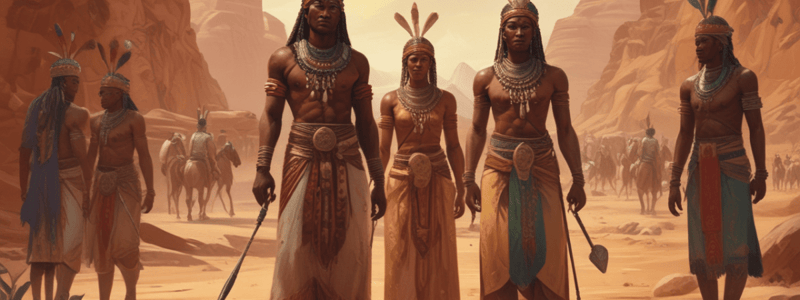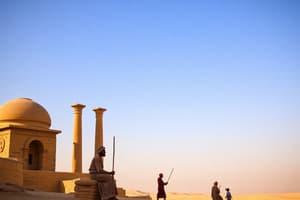Podcast
Questions and Answers
What natural borders in the Nile helped separate Nubian kingdoms like Kush from Egypt?
What natural borders in the Nile helped separate Nubian kingdoms like Kush from Egypt?
The natural borders in the Nile included cataracts and the river's geography.
Which one of these kingdoms came first?
Which one of these kingdoms came first?
- Kerma (correct)
- Meroe
From what continent and region did the ancestors of Native Americans come from and how did they get here?
From what continent and region did the ancestors of Native Americans come from and how did they get here?
They came from Asia, specifically from Siberia, via the Bering Land Bridge.
What kind of tools did these people use during this transition?
What kind of tools did these people use during this transition?
Where did the Mayan civilization arise and how long did it last?
Where did the Mayan civilization arise and how long did it last?
What two sciences were the Maya particularly gifted at?
What two sciences were the Maya particularly gifted at?
Who is considered the founder of Islam and what region of the world did it develop?
Who is considered the founder of Islam and what region of the world did it develop?
What is the holy text of Islam called and why was it important?
What is the holy text of Islam called and why was it important?
Who were the Mongols and who was Genghis Khan?
Who were the Mongols and who was Genghis Khan?
What were the four major legacy contributions of Genghis Khan we reviewed?
What were the four major legacy contributions of Genghis Khan we reviewed?
What was the most important change to European religion created by the Reformation?
What was the most important change to European religion created by the Reformation?
What are the three key contributions of the Enlightenment, and what did they do?
What are the three key contributions of the Enlightenment, and what did they do?
What was the name of the system that included landowners and dependent farmers called peasants?
What was the name of the system that included landowners and dependent farmers called peasants?
What were the political reforms that sparked the French Revolution?
What were the political reforms that sparked the French Revolution?
Who led the revolutions in Latin America and how did they differ from those in Europe?
Who led the revolutions in Latin America and how did they differ from those in Europe?
Who was the Emperor of the First French Empire?
Who was the Emperor of the First French Empire?
The murder of Archduke Ferdinand started the First World War by creating tensions between what two nations?
The murder of Archduke Ferdinand started the First World War by creating tensions between what two nations?
In what year did the Great Stock Market Crash occur and what was the primary cause?
In what year did the Great Stock Market Crash occur and what was the primary cause?
What were the names of the two alliances in World War One?
What were the names of the two alliances in World War One?
What were the names of the alliances in World War Two?
What were the names of the alliances in World War Two?
Why did the US enter into each World War?
Why did the US enter into each World War?
In what year did Germany surrender during World War Two and why?
In what year did Germany surrender during World War Two and why?
In what year did Japan surrender and why?
In what year did Japan surrender and why?
The partition of the Middle East was largely between what two kinds of political states?
The partition of the Middle East was largely between what two kinds of political states?
What economic resources were of interest to Europe and the United States in the Middle East?
What economic resources were of interest to Europe and the United States in the Middle East?
What are the key traits of capitalism and a free market?
What are the key traits of capitalism and a free market?
What are the key traits of socialism and who is credited as its founder?
What are the key traits of socialism and who is credited as its founder?
What is nationalism and what, as a system, is its focus?
What is nationalism and what, as a system, is its focus?
Flashcards are hidden until you start studying
Study Notes
Nubia and Southern Nilotic Civilizations
- Natural borders of the Nile, such as cataracts, separated Nubian kingdoms like Kush from Egypt.
- Kerma was established before Meroe, making it the earlier of the two kingdoms.
The Americas
- Ancestors of Native Americans migrated from Asia across the Bering Land Bridge.
- Early inhabitants utilized stone tools during their transition into the Americas.
Meso-America
- The Mayan civilization emerged in present-day Mexico and Central America, lasting over a millennium.
- The Maya excelled in astronomy, developing a calendar, and mathematics, including the concept of zero.
Rise of Islam and Central Asia
- Islam was founded by the Prophet Muhammad in the Arabian Peninsula.
- The holy text of Islam, the Quran, is crucial for guidance and law in the Muslim faith.
- The Mongols were a nomadic group, with Genghis Khan as their most notable leader, unifying them and expanding their empire.
- Genghis Khan's legacies include military strategies, cultural exchanges, trade route security, and administrative governance.
The Reformation and the Enlightenment
- The Reformation's most significant change was the decentralization of religious authority, leading to the rise of Protestantism.
- Enlightenment contributions include the promotion of reason, individualism, and scientific inquiry, influencing modern philosophy and political thought.
- The feudal system included landowners and dependent farmers known as peasants.
18th and 19th Century Europe
- Political reforms like the demand for liberty, equality, and fraternity sparked the French Revolution.
- Latin American revolutions, led by figures such as Simón Bolívar, sought independence from colonial rule, contrasting with European revolutions focused on regime change.
- Napoleon Bonaparte was the Emperor of the First French Empire.
The World Wars
- The assassination of Archduke Ferdinand heightened tensions primarily between Austria-Hungary and Serbia, igniting World War One.
- The Great Stock Market Crash occurred in 1929, primarily due to speculative investments and economic instability.
- World War One alliances were the Allies and Central Powers; World War Two saw the Allies and Axis powers.
- The United States entered World War One to support Allies, while in World War Two, the U.S. responded to the attack on Pearl Harbor.
- Germany surrendered in 1945 due to military defeat; Japan surrendered later that year after atomic bombings in Hiroshima and Nagasaki.
Modern Middle East
- The partition of the Middle East largely involved nation-states and imperial powers.
- Economic interests of Europe and the U.S. in the Middle East centered around oil resources.
Modern Economic and Political Systems
- Capitalism emphasizes private property, free markets, and voluntary exchanges.
- Socialism advocates for collective ownership and control of resources, credited to Karl Marx as a foundational theorist.
- Nationalism focuses on the interests and culture of a specific nation, promoting national identity and unity.
Studying That Suits You
Use AI to generate personalized quizzes and flashcards to suit your learning preferences.




